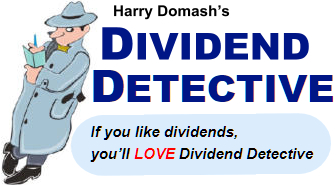CLOSED-END
FUNDS (CEFs)
Better than ETFs: How to Pick the Best
Closed-End-Funds
10 Best
High-Dividend Closed-End Funds
|
Dividend Detective
• $5 first month, then $15/mo •
No Minimum •
Cancel Anytime
Want to enjoy the
low-risk, high dividends that Closed-End Funds deliver?
DD's Three
Closed-End Fund Portfolios
Highest Returning
Tax-Free Muni CEFs • Best
Growth Stock CEFs • Best Monthly Paying CEFs
Click
here to subscribe |
If you’re like most investors, you probably
know little or nothing about closed-end funds. But you should! They offer
many advantages over conventional mutual funds as well as
exchange-traded-funds (ETFs). Here are the details.
Closed-end funds are similar to conventional
managed mutual funds, but with one major difference: rather than selling
and redeeming shares as needed, closed-end funds sell a fixed number of
shares via an initial public offering (IPO). After that, the fund trades
just like a stock. Buyers must purchase from existing shareholders, and
shareholders must find a buyer if they want to sell.
Advantages of Closed-End Funds
To appreciate why that’s important, you have to understand a little bit
about the psychology of the typical mutual fund investor (present company
excepted, of course).
Research shows that most investors pour money
into mutual funds long after the market has started to move up. Since
mutual fund managers must deploy the new money, they are forced to buy
stocks that have already scored big gains.
Conversely, many investors sell their mutual
fund holdings after the market has already suffered a big drop. When that
happens, fund managers
must raise cash to redeem fund shares by selling stocks that are likely
trading near their lows. Thus, mutual fund investors force
funds to buy high and sell low.
But closed-end fund managers don’t have that
problem. Except for portfolio gains and/or losses, they have a fixed
amount of money to invest. Consequently, they can make investment decisions
without worrying about raising cash to redeem shares, or finding places to
invest unexpected new cash. This stability seems to lend itself
particularly well to funds that focus on dividend paying investments.
Buy Assets at Discount
Here’s another advantage.
A fund’s net asset value (NAV) is the value of its total assets expressed
on a per share basis. For instance, if a fund had $5,000 of assets and 100
shares out, its NAV would be $50 per share. Because they create or retire
shares as needed, conventional mutual funds always trade at their NAVs.
But that’s not true for closed-end funds.
Since share prices reflect the balance of supply and demand, closed-end
funds rarely trade at their NAVs. Instead, they trade either above
(premium) or below (discount) their NAVs. The good news is that most funds
trade at discounts, typically five to 10% below their NAVs. That’s
especially important for dividend fund investors because you can get $100
of income producing assets for $90 to $95.
CEF Connect (www.cefconnect.com)
is the go-to site for information on closed-end funds.
Here are three more factors to keep in mind: leverage, distribution policy and return of capital.
Closed-End Fund Leverage
Many closed-end funds employ leverage, meaning they borrow funds, to
increase returns. The math works like this. Say you can borrow money at a
3% short-term rate and invest it in longer-term assets returning 7%. Using
those numbers, you’re making 4% annually on the borrowed funds. Leverage
is the secret sauce that allows many closed-end funds to pay much higher
dividends than similar conventional mutual funds or ETFs. Leverage
works great as long as the spread between short- and long-term rates
doesn’t shrink too much. A narrowing spread, which could happen in a
rising interest rate environment, could pressure profit margins.
CEF Distribution Policy
Like conventional mutual funds, closed end funds do not pay income taxes on amounts
distributed to investors. Instead, the taxes "pass through" to the
shareholders. However, since capital gains vary unpredictably, that
practice makes dividend payouts equally unpredictable.
Consequently, many funds have instituted a managed distribution policy
to make the distributions more stable. In those cases, the fund
distributes a fixed percentage of its net assets regardless of its actual
interest income and capital gains.
CEF Return of Capital
If a fund with a managed distribution policy doesn’t earn enough to
pay the dividend, it funds the shortfall by dipping into its capital,
which reduces its asset value. That portion of the dividend is designated
as "return of capital." If a fund were to do that consistently, its
payouts would reduce its net asset value, which, in turn, would reduce its
earnings capacity. However, because funds must designate payouts resulting
from capital gains as return of capital, you can't assume that
payments labeled that way are actually reducing net asset value. You can
use CEF Connect to see long-term price charts simultaneously displaying market prices
and net asset values. Generally, market prices and net asset values move
more or less together. Consistent underperformance of net asset value vs.
market price warns that a fund may be selling assets to fund its
distributions.
Start Enjoying Closed-End-Fund Advantages Now
Dividend Detective Premium offers access to DD's two
managed Closed-End-Fund portfolios: 1) Monthly Paying CEFs,
which holds high-dividend funds that pay monthly, and 2) CEF Growth
Opportunities that gives you a way to participate in fast growing
sectors such as tech and financial services, and still
enjoy high-dividends. Each portfolio holds the five best performing CEFs
in each category.
Dividend Detective Premium costs $5 for the
first month, and $15/month thereafter. There is no
minimum subscription. You could cancel Dividend Detective
Premium at any time. Those prices include access to all DD
Premium features. Click here
to subscribe or here for
more information.
|
